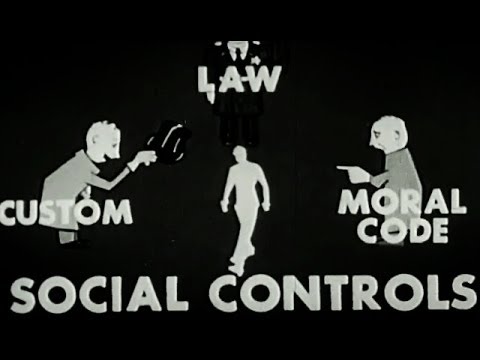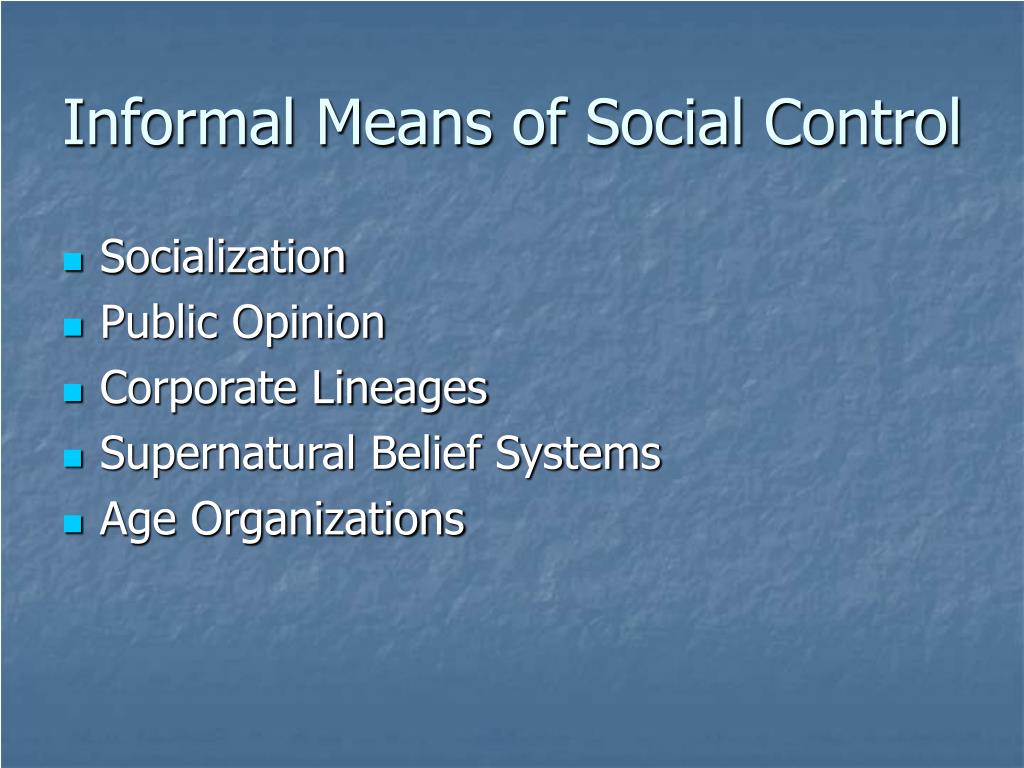Imagine walking into a crowded elevator. You instinctively step to the side, letting others enter first. You avoid making eye contact with strangers. You hold your breath as the elevator lurches to a stop, and finally, you step out, blending back into the bustling masses. This seemingly mundane experience highlights the complex web of unspoken rules and social expectations that govern our daily lives. These rules, enforced not by laws or formal institutions but by social pressures and norms, are what we call informal social control.

Image: www.tes.com
Informal social control is a fascinating aspect of human behavior, shaping how we interact with each other and navigate the world around us. It goes beyond explicit laws and regulations, operating through subtle gestures, shared values, and the fear of social disapproval. This article will delve into the intricacies of informal social control, exploring its mechanisms, its impact on society, and its ever-evolving nature.
Understanding the Invisible Hand of Social Control
Informal social control is like a silent orchestra, each individual playing their part to maintain social harmony. It’s a powerful force that shapes our choices, guides our behavior, and influences our perceptions of right and wrong. Unlike formal social control, which relies on institutions like courts, police, and governments, informal control operates through the intricate network of social relationships and shared cultural values.
The power of informal social control lies in its pervasiveness. It permeates our everyday experiences, from the way we dress and speak to the values we hold dear. It’s embedded in our families, our communities, and our social circles. This constant presence, though often invisible, serves as a powerful mechanism for regulating behavior and upholding societal norms.
The Mechanisms of Informal Social Control
Socialization and Internalization
Informal social control starts with socialization, the process of learning and internalizing the norms, values, and beliefs of our culture. Through our families, peers, teachers, and the media, we absorb social expectations and develop a sense of what is acceptable and unacceptable behavior. This internalization of social norms becomes a guiding force, shaping our actions even when no one is watching.

Image: www.slideserve.com
Social Sanctions
Informal social control relies on social sanctions to ensure compliance. These sanctions can range from subtle disapproval to more overt forms of punishment. A simple frown, a whispered comment, or an icy stare can convey disapproval and discourage unwanted behavior. Conversely, positive reinforcement through praise, acceptance, and social approval encourages individuals to conform to societal norms.
Social Pressure and Conformity
The desire to fit in and avoid social ostracism is a powerful motivator for following informal norms. We are constantly bombarded with messages about “proper” behavior, and deviating too far from these expectations can lead to social isolation, ridicule, or even ostracism. This fear of social disapproval can be a potent force, driving individuals to conform to the prevailing social norms even if they don’t fully agree with them.
The Impact of Informal Social Control on Society
The impact of informal social control is significant, shaping both the character of society and the experiences of individuals within it. It can be viewed as a double-edged sword, offering both benefits and drawbacks.
Benefits of Informal Social Control
Informal social control helps maintain order and stability within societies. It discourages antisocial behavior, promotes cooperation, and fosters a sense of shared values. The subtle pressures of social norms can encourage individuals to act in ways beneficial to society, contributing to social cohesion and preventing widespread conflict.
Drawbacks of Informal Social Control
Informal social control can also have its downsides. It can be used to enforce oppressive or discriminatory norms, stifling individual expression and perpetuating inequalities. Social pressures can lead to conformity and a suppression of dissenting voices, ultimately hindering social progress and innovation.
The Evolving Landscape of Informal Social Control
Informal social control is not static but is constantly evolving, adapting to changing social values and technological advancements. The rise of social media has introduced new forms of informal control, with online communities shaping norms, enforcing sanctions, and influencing behavior in unprecedented ways. The internet provides a platform for individuals to connect and share their views, but it also creates new avenues for social pressure and conformity, presenting potential challenges for individual autonomy and free expression.
Tips and Advice for Navigating Informal Social Control
While informal social control is an integral part of society, it is crucial to balance the pressures of conforming with the importance of individual expression. Here are some tips for navigating the often-subtle world of social norms:
- Be aware of your surroundings: Pay attention to the unspoken rules and expectations within different social contexts. Observe how others behave and adjust your own behavior accordingly.
- Challenge oppressive norms: Don’t be afraid to question norms that perpetuate inequality or limit individual freedom. Speak out against injustice and advocate for change.
- Embrace your individuality: While conforming to some social norms is necessary, don’t suppress your unique identity. Express yourself authentically while navigating social expectations.
By being mindful of the unspoken rules of society, engaging in critical thinking, and asserting your individuality, you can navigate the nuances of informal social control while remaining true to yourself.
Frequently Asked Questions about Informal Social Control
Q: What are some examples of informal social control in action?
A: Examples of informal social control are abundant in our everyday lives. They include:
- Gossip: Spreading negative information about individuals who deviate from social norms can discourage them from repeating their actions.
- Peer pressure: Friends and acquaintances can exert pressure to conform to group norms, influencing individuals’ choices regarding fashion, music, or even political views.
- Public shaming: Negative attention, online or offline, directed at individuals who violate social expectations can serve as a form of informal punishment.
Q: How does informal social control differ from formal social control?
A: Informal social control operates through social pressures and norms, often enforced through subtle sanctions, while formal social control relies on laws, regulations, and institutions like the police and courts.
Q: Is informal social control always negative?
A: Not necessarily. While it can be used to enforce harmful or oppressive norms, informal social control can also be a force for good, promoting cooperation, building community, and discouraging antisocial behaviors.
What Is Informal Social Control
Conclusion
Informal social control is an integral part of human society, shaping our interactions, guiding our behaviors, and defining our understanding of right and wrong. While it can be a powerful force for maintaining order and upholding shared values, it can also be used to enforce oppressive norms and limit individual expression. As we navigate the ever-evolving landscape of social interactions, understanding the intricacies of informal social control is essential for navigating social pressures while upholding our individual identities and advocating for a more just and equitable society.
Do you have any experiences with informal social control that you’d like to share? Have you witnessed its positive or negative influence in your own life? Share your thoughts and perspectives in the comments section below. Let’s continue this discussion and explore the fascinating world of informal social control together.






